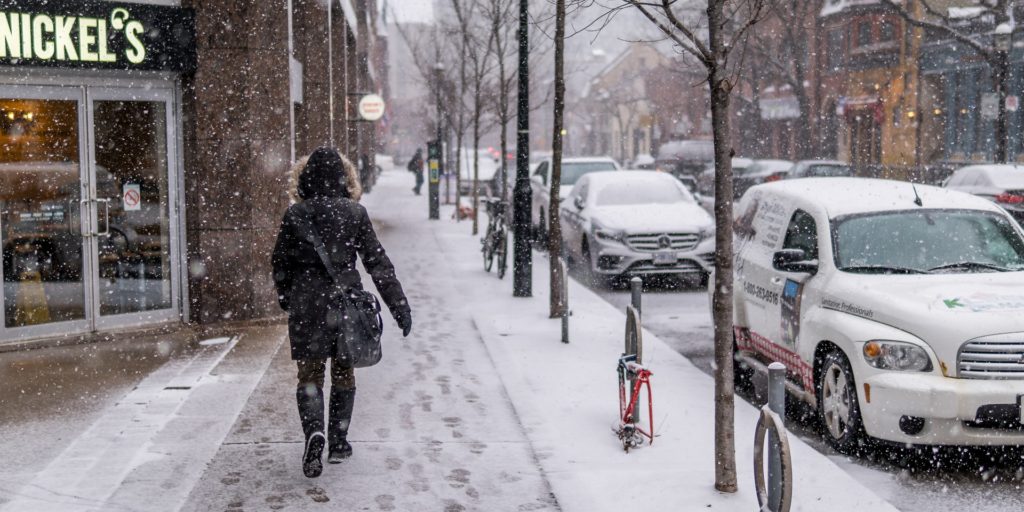- Poorly shovelled sidewalks will lead to slip and falls this winter - December 11, 2024
- Brain injuries are costly on an emotional and physical level - November 22, 2024
- Long-term disability payments could come with a tax liability - October 23, 2024
By Paul Russell, LegalMatters Staff • As cold temperatures and snow replace warm autumn days, slip and falls grow more inevitable.
If you suffer serious physical damage after a tumble on someone else’s unsalted driveway or adjoining sidewalk in Ontario, a bill passed late last year sharply limits the time period you have to start legal action, says Toronto personal injury lawyer Joshua Goldberg.
“Because of our winters, slip and falls are common in Canada”, says Goldberg, principal of Joshua Goldberg Law. “Yet many people do not know they can take legal action if they are hurt after a fall caused by someone else’s negligence – as long as that claim is filed in time.”
He explains that with the passage of Bill 118 in December 2020, the Ontario government reduced the period people have to inform the property owner of their injuries from two years to just 60 days.
“Before this change, people could wait two years to notify a property owner that they were launching legal action, and that notice could be verbal in nature,” Goldberg tells LegalMattersCanada.ca. “Not any longer.”
Notice period went from two years to 60 days
He notes the amended act stipulates that “No action shall be brought for the recovery of damages for personal injury caused by snow or ice … unless, within 60 days after the occurrence of the injury, written notice of the claim, including the date, time and location of the occurrence, has been personally served on or sent by registered mail.”
If a person is hurt after a fall on municipal property, the rules are even more stringent, Goldberg says, as you only have 10 days to send the city clerk a registered mail, informing them of your injury.
The Occupiers’ Liability Act defines an “occupier” as someone who has physical possession of a property. It can also be someone responsible for maintaining it, such as an independent contractor hired to remove snow or ice.
Goldberg says he can understand why the Act was amended to shorten the notice period.
‘There is a fairness in requiring a notice period’
“There is a fairness in requiring a notice period. If you slip on a driveway that has not been salted, and you wait two years to make a claim, the person who owns the property will not be able to defend themselves, as there is no way they can show the conditions of the property at the time of the incident,” he says.
“Yet under the new rules, injuries resulting from a slip and fall may not become apparent until after the 60-day notice period, or after the injured person has become aware of their right to launch legal action.”
- We can expect to see more COVID long-haulers in court soon
- General and special damages possible after a personal injury
- Pandemic the perfect time to launch a virtual law practice
The court can grant exceptions to the 60-day rule, Goldberg says, giving the example of people too badly injured to file the notice within that period.
“I have had many clients who were unaware of their legal right to make a claim after a fall until someone suggested it to them,” he says. “That problem will be exacerbated by this dramatically shorter deadline, and some people who deserve compensation will be unable to receive it.
‘New law will hurt a lot of people’
“This new law will hurt a lot of people,” Goldberg adds.
If someone is injured in a car accident due to someone else’s action, he says people know they can rely on insurance and the courts for compensation, since someone is being held responsible.
“With slip and falls, it is not like someone has pushed you and caused you to fall. It is more of a passive negligence that caused the accident,” Goldberg says. “It is not as obvious to those who are injured that someone is still at fault.”
If you suffer injury due to a fall on someone’s driveway or sidewalk, he recommends taking photos or videos of the icy conditions to help bolster your case.
“Seek legal advice immediately,” Goldberg advises. “You will need help to navigate the legal process and to ensure you receive the compensation you deserve.”
$375,000 cap on non-pecuniary damages
Under Ontario law, he notes the cap for non-pecuniary damages – to compensate a plaintiff for pain, suffering and loss of enjoyment of life – is approximately $375,000, with exceptions for special cases.
“Other areas are not capped, such as loss of income or special damages for medical expenses needed after the injury,” Goldberg says. “Claim what you think is appropriate, as you will need that money if you are badly injured.”
“Everyone knows they have insurance in case they are hurt in a car due to someone else’s negligence, but many people don’t think about what will happen if they are hurt after falling on an icy sidewalk or driveway,” he says.

